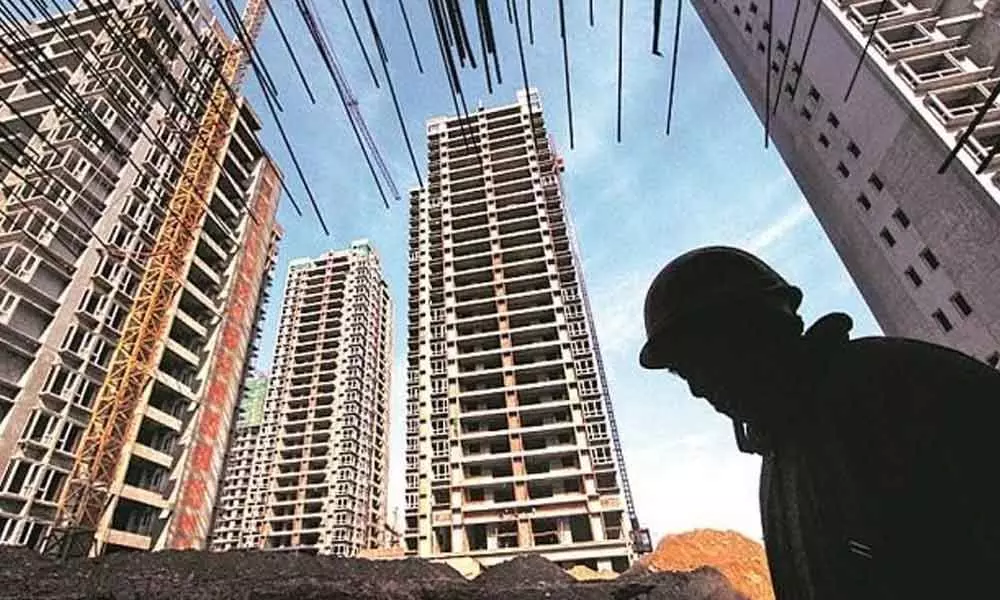Live
- Sr National Badminton: Unseeded Rounak Chauhan, Adarshini Shri reach singles semis
- Punjab seeks central assistance to strengthen security in areas adjoining Pakistan
- Malaysian national held from Tamil Nadu for cyber fraud of Rs 2.81 crore
- Child marriage will be eradicated by 2026: Assam CM
- PMK President Anbumani Ramadoss urges TN government to act against online gambling
- From defence to culture and sports, India and Kuwait sign key agreements during PM Modi's visit
- Mahakumbh 2025: 110 mist blower machines and 107 fogging units to keep Akharas insect-free
- Piyush Goyal participates in Mahila Shakti Shivir event, calls Bima Sakhi Yojana 'a revolutionary initiative'
- Death toll from Cyclone Chido in Mozambique rises to 94
- 13 criminals from two gangs arrested in Jharkhand's Ramgarh for extortion
Just In
Stressed real estate assets offer investment opportunities


Institutional investors have made a solid start by investing $1 bn in stressed real estate opportunities.
Institutional investors have made a solid start by investing $1 bn in stressed real estate opportunities. This strategy is expected to gain pace as the Insolvency and Bankruptcy Code (IBC) law, introduced in 2016, gets more established in the country.
Corporates saddled with huge debt have been liquidating real estate assets, leading to new opportunities. Investors are evaluating various options including acquiring non-performing assets, distress sale and entity level stake.
Rising interest of investors
The recent stressed asset deal has been the sale of an IT park in Bengaluru by Café Coffee Day Enterprise Ltd. for $385 million to reduce its debt.
Blackstone and Salarpuria Sattva Developers have acquired the 90-acre, IT-focussed Global Village Tech Park.
Similarly in Hotel sector, Brookfield has received approvals to acquire assets of Hotel Leela Venture comprising key hotel properties in Delhi, Bangalore, Udaipur and Chennai for $564 million.
The capital commitment by institutional investors gives comfort to the lenders leading to faster resolution in these deals. Such deals also provide opportunity for investors to optimise their returns in line with underlying risks.
Housing offers huge potential
However, in the current scenario, it is the residential real estate segment that presents the maximum amount of stressed assets.
India's residential sector has been reeling under the pressure of delayed/stalled projects with 4.54 lakh units running behind their completion dates.
Some of them are already under bankruptcy proceedings. The value of these projects is estimated to be USD 66 bn.
The NBFC debacle and subsequent liquidity crisis added to the problems of most of these projects. The closing of refinance window led to many stalled projects for want of finance.
This coupled with buyer's preferring to look at ready-to-move-in properties affected the housing projects.
In order to ensure that delivery of homes locked in stalled housing projects, the government announced a special funding window for stalled affordable and middle-income housing projects.
This fund with commitment from the government and other lending institutions is expected to be $3.5 billion. This special fund is expected to infuse the much-needed liquidity but will fall short of meeting the entire requirement.
The legal framework of IBC
This provides opportunity for institutional investors to acquire stuck projects / assets at distress value and make them viable.
The legal framework under the Insolvency and Bankruptcy Code (IBC) gives the required timeliness and assurance to investors as well lenders.
The centre introduced the Insolvency and Bankruptcy Code (IBC) in 2016 to set a procedure to deal with bad loans plaguing the banking sector.
This brought about a complete change in attitude towards the resolution. The defaulting company use to drag the process leading to erosion in its value and leaving little for the creditors.
The bankruptcy procedure has evolved very soon since its implementation and is expected to improve further.
As per the Insolvency and Bankruptcy Board of India, a total 115 insolvency cases have been filed as of September 2019 under real estate category. Of these 87 cases are under process while 28 are closed.
Hopefully, soon the challenges of the sector will be over. Recovery in housing sales, implementation of RERA and liquidity infusion from the government are likely to improve the sentiments. As a result, the growth will be reflected in coming quarters.
The author is the CEO & Country Head – India, JLL

© 2024 Hyderabad Media House Limited/The Hans India. All rights reserved. Powered by hocalwire.com






